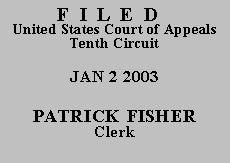

| TERRENCE M. BROWN,
v.
WARDEN, Springfield Medical
Center for Federal Prisoners; CARLA
STOVALL, Attorney General of
Kansas |
No. 02-3210 |
Terrence M. Brown, Pro Se.
On August 7, 1997, Brown pled no contest in a Kansas state court to charges of aggravated indecent solicitation of a child relating to an incident when he exposed himself to a youth. Brown completed this state sentence on February 25, 2000, and was subsequently transferred to federal custody for a conviction arising from a different incident, in which he attempted to induce another youth to engage in sexually explicit conduct in violation of 18 U.S.C. § 2251. On February 14, 2001, Brown filed a petition for a writ of habeas corpus pursuant to 28 U.S.C. § 2254, challenging his prior state sentence.
In his § 2254 petition, Brown claimed that he received ineffective assistance of counsel at his state trial and that the state judge erred in denying his motion to withdraw his plea. Although Brown was no longer in state custody when his § 2254 petition was filed, he claimed that he could still attack the state sentence because it affected his current federal sentence. The district court dismissed the case for lack of jurisdiction.
Brown's petition was filed after April 24, 1996, the effective date of the Antiterrorism and Effective Death Penalty Act ("AEDPA"), and thus AEDPA's provisions apply to this case. See Rogers v. Gibson, 173 F.3d 1278, 1282 n.1 (10th Cir. 1999) (citing Lindh v. Murphy, 521 U.S. 320 (1997)). AEDPA provides that a challenge to detention arising from a state court decision may not be appealed unless a COA is granted. 28 U.S.C. § 2253(c)(1)(A). A COA may be issued "only if the applicant has made a substantial showing of the denial of a constitutional right." § 2253(c)(2). Because the district court denied Brown's motion for a COA, we proceed to analyze whether a COA should have been granted.
Under § 2254, this court shall "entertain an application for a writ of habeas corpus in behalf of a person in custody pursuant to the judgment of a State court only on the ground that he is in custody in violation of the Constitution or laws or treaties of the United States." § 2254(a) (emphasis added). Brown has completely served his state sentence, and thus he is no longer "in custody pursuant to the judgment of a State court." A prisoner who has completely served his state sentence is not entitled to habeas relief under § 2254 even if the state sentence affected the calculation of his federal sentence. See Tomlinson v. Mendez, 9 Fed. Appx. 853, 85455 (10th Cir. 2001); Charlton v. Morris, 53 F.3d 929, 929 (8th Cir. 1995) (per curiam) (citing Maleng v. Cook, 490 U.S. 488, 492 (1989) (per curiam)). Accordingly, the district court lacked jurisdiction to entertain Brown's § 2254 petition.(1)
As we are obligated to construe pro se filings liberally under Haines v. Kerner, 404 U.S. 519, 520 (1972), it might be possible to recharacterize Brown's petition as a 28 U.S.C. § 2255 petition. Such a petition, however, would ultimately fail. Brown has already brought a § 2255 petition--which was denied--claiming that his federal conviction was imposed in violation of the Constitution. See United States v. Brown, 7 Fed. Appx. 825, 826, 829 (10th Cir. 2001). By bringing his prior § 2255 motion, Brown challenged his federal sentence as well as his federal conviction. See 28 U.S.C. § 2255 (characterizing a § 2255 petition as a motion to "vacate, set aside, or correct [a federal] sentence" (emphasis added)). Another § 2255 petition would accordingly constitute a second or successive claim that his current federal sentence is subject to collateral attack.
In order for a petitioner to bring a second or successive § 2255 motion, we must certify the motion to contain
(1) newly discovered evidence that, if proven and viewed in light of the evidence as a whole, would be sufficient to establish by clear and convincing evidence that no reasonable factfinder would have found the movant guilty of the offense; or
(2) a new rule of constitutional law, made retroactive to cases on collateral review by the Supreme Court, that was previously unavailable.
Id. Brown has not offered any "newly discovered evidence," nor has he cited any new rules of constitutional law made retroactive to cases on collateral review by the Supreme Court.(2) Therefore, we could not certify a second or successive § 2255 motion, and we consequently decline to recharacterize Brown's § 2254 petition as a § 2255 petition.
Because the district court lacked jurisdiction to entertain Brown's petition, the application for a COA is DENIED and the matter is DISMISSED.
*.At the parties' request, the case is unanimously ordered submitted without oral argument pursuant to Fed. R. App. P. 34(f) and 10th Cir. R. 34.1(G).
1. Brown relies on Foster v. Booher, 296 F.3d 947 (10th Cir. 2002), to support the proposition that a prior sentence can be challenged while a second, consecutive sentence is being served. Foster, however, involved two consecutive state sentences, not a state sentence followed by a federal sentence. Id. at 94849. The petitioner in Foster was in state custody when he brought his § 2254 petition in federal court. Id. at 948. Accordingly, Foster does not address the issue of whether a federal prisoner may bring a § 2254 petition to challenge a state sentence that has been fully served.
2. The two Supreme Court cases upon which Brown principally relies, Garlotte v. Fordice, 515 U.S. 39 (1995), and Peyton v. Rowe, 391 U.S. 54 (1968), were both decided before Brown's prior § 2255 motion, and could have been cited in that petition, had he chosen to make the argument at that time.